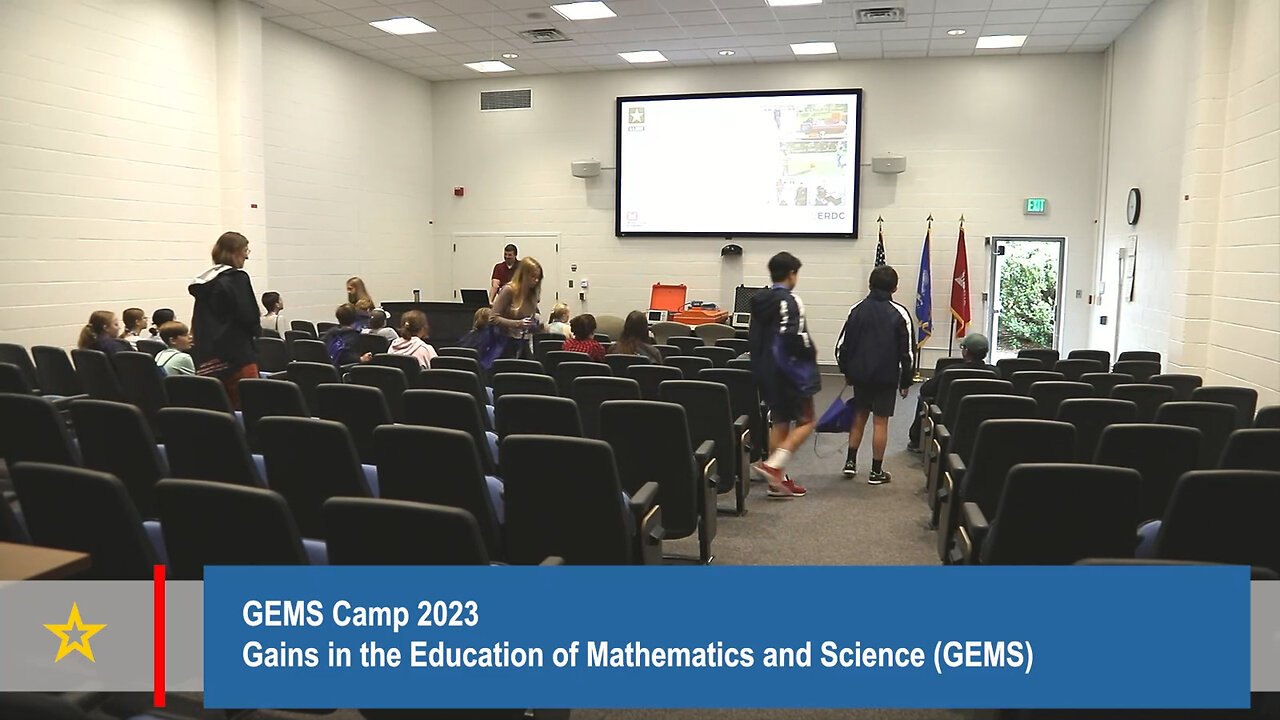Premium Only Content

GEMS Camp
Credit: Joseph Bara | Date Taken: 08/07/2023
Gains in the Education of Mathematics and Science (GEMS) CRREL conducted its first on-site Gains in the Education of Mathematics and Science (GEMS) Summer Camp Program in the week of June 26 – 30, 2023, entitled Exploring Weather, Climate, and the Environment. This event was provided to 7th and 8th grade students participating from New Hampshire, Vermont, Massachusetts, North Carolina, and New York who have a great interest in science and technology. CRREL provided twelve Science and Engineering (S&E) experts to execute a full week of activity, including ten modules, practical skills and interaction with science tools and equipment, and presentations from each team of participants. The GEMS Camp Program serves to provide students with hands-on activities and team building skills while having fun learning about science and technology. Soil not Dirt Soil is a great habitat for living organisms. Some of the organisms are so small that you can’t even see them. Come learn how to make batteries out of soil! We will make terrestrial microbial fuel cells, measure how much power they produce, understand how water affects them, and grow some of the soil organisms that are doing the job. This module is appropriate for any student who likes hands on experience in the laboratory. Ground Penetrating Radar Ground Penetrating Radar (GPR) is a non-destructive geophysical technique used to image the subsurface. GPR transmits electromagnetic waves into the subsurface, which reflect off features as electrical properties of the subsurface change. GEMS Camp students took turns to tow the antenna and look at the data on the control unit. Searching for macroinvertebrates from stream beds To teach students about the importance of aquatic insects in streams and the health of water sheds and streams in their local environment, students sift through leaf packs that have been resting on the stream bed for a few weeks to determine the number and type of macroinvertebrates they find. Students used magnifying glasses and microscopes to count and identify the aquatic insects they have found in their leaf packs and discussed how this data can be used to understand changes in aquatic insect communities and water quality.
-
 8:33
8:33
SKAP ATTACK
17 hours ago $2.28 earnedWhat Went Wrong With the Nuggets
28K4 -
 23:51
23:51
JasminLaine
16 hours agoCBC STUNNED Into Silence as Carney PANICS—Defends Bill C-69 and His Foreign Profits
26.8K22 -
 17:25
17:25
World2Briggs
13 hours ago $2.75 earnedThe Dark Reality Of Human Trafficking In The United States
21.7K13 -
 4:31
4:31
Mrgunsngear
15 hours ago $5.69 earnedBreaking: Kash Patel No Longer ATF Director! Replacement Has Been Named
25.5K17 -
 43:42
43:42
Esports Awards
1 day agoAustinJohnPlays on Pokémon Card Collection & Evolution of YouTube | Origins Podcast #2
18.6K -
 59:35
59:35
Trumpet Daily
22 hours ago $5.20 earnedStrongman Stare Down - Trumpet Daily | Apr. 9, 2025
23.6K6 -
 2:50:22
2:50:22
TimcastIRL
14 hours agoTrump Hits China With 125% Tariff, Pauses Others, Sees LARGEST Market Rally IN HISTORY | Timcast IRL
403K281 -
 1:43:15
1:43:15
Glenn Greenwald
16 hours agoTrump's Tariffs: A Threat to the Neoliberal Order? With Journalist David Sirota; Biden CBP Fabricated Doc to Help Imprison Bolsonaro Adviser? Plus: Israel Support Collapsing | SYSTEM UPDATE #436
237K131 -
 15:04
15:04
T-SPLY
18 hours agoMSNBC Accuses Trump Of "Snatching" Illegal Immigrants For Political Show
119K56 -
 2:01:37
2:01:37
Melonie Mac
18 hours agoGo Boom Live Ep 44!
152K45